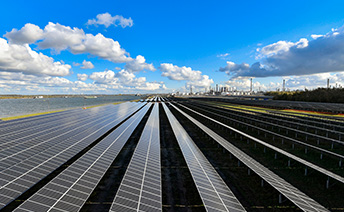United Kingdom Petroleum Industry Association (UKPIA)
UKPIA represents the interests of members and associates across the downstream oil sector in the UK.[1]
Membership of board/executive committee: Shell is a member of the UKPIA Council which governs UKPIA.[2]
- 2022 assessment outcome: Aligned
- 2021 assessment outcome: Aligned
Summary
Shell benefits from its membership of UKPIA, which provides a platform to engage government on common issues impacting the downstream sector in the UK, for example the impacts of fuel protests, refining sector issues and implementation of regulatory changes.
We found UKPIA to be aligned with our climate and energy transition-related policy positions.
We will remain a member of UKPIA. We will continue to engage the association on climate and energy transition topics. We will continue to track alignment between UKPIA’s climate and energy transition-related positions and our own.
Further information
Click on the sections below to read more.
- UKPIA has stated support for the UK target of net-zero emissions by 2050.[3] [4] [5] [6]
- In its 2022 response to the Net Zero Review call for evidence, UKPIA stated “investment in net zero manufacturing technologies such as low carbon fuels, hydrogen and Carbon Capture Utilisation and Storage (CCUS) encourages economic growth while ensuring that assets can deliver their full economic potential on a long-term sustainable basis as well as contributing to the UK’s energy resilience.”[7]
- UKPIA’s “Future Vision Series” of reports provides UKPIA’s vision for the future of the downstream oil sector and how it can contribute to decarbonisation goals.[8]
- UKPIA has stated support for carbon pricing.[9] [10] [11]
- In its 2022 response to the Net Zero Review call for evidence, UKPIA stated that the UK ETS price is currently higher than the EU ETS, which risks creating carbon leakage. It stated potential solutions to this issue, including the UK rejoining the EU ETS, to link the UK ETS with the EU ETS, or to introduce a well-designed Carbon Border Adjustment Mechanism (CBAM).[12] [13] UKPIA also highlighted this point in its 2022 response to the UK government’s “Low Carbon Fuels Strategy – call for ideas”, in which it stated: “We would ask that the government look carefully at the UK ETS scheme as a significant additional burden on the UK refining industry against European competitors. This disincentivises investment in the UK fuel supply industry and risk the closure of UK refineries. This has the effect of reducing the business cases for UK CCUS schemes by removing a large source of CO2 and has the potential to simply off-shore UK emissions.”[14]
- UKPIA has stated support for policies for energy efficiency.[15]
- In its 2022 response to the Potential Reforms to UK’s Capital Allowance Regime, UKPIA stated that improvements to Enhanced Capital Allowances could improve (industrial) energy efficiency investment conditions.[16]
- UKPIA has stated support for a role for low-carbon hydrogen and recognises the different ways to produce it, including through use of natural gas with carbon capture and storage (CCS), or through electrolysis using renewable energy.[17] [18] [19] [20]
- In its 2022 response to the Net Zero Review call for evidence, UKPIA stated that it strongly encouraged “the progression of support for low carbon hydrogen and CCUS business models as soon as possible”.[21]
- In its 2022 response to the UK government’s Low Carbon Fuels Strategy – call for ideas, UKPIA stated support for the inclusion of low-carbon hydrogen in the strategy.[22]
- In its 2022 response to the UK government’s consultation on proposals for hydrogen transport and storage business models, UKPIA stated that it agreed “with the Government’s analysis and vision for hydrogen network evolution through the different phases” and that the “Low Carbon Hydrogen (LCH) Transport and Storage (T&S) Business Model needs to be available much sooner than outlined in the Consultation.”[23]
- UKPIA has stated that it believes there is a potential role for government in supporting companies to invest in nature-based solutions “by promoting voluntary offset markets, with the potential to use offsets in meeting compliance obligations under emissions trading and other policies. However, we believe the need for robust monitoring, reporting and verification of emissions (including negative emissions) should also be addressed through global initiatives”.[24]
- UKPIA has stated support for CCS and for policy mechanisms to drive its deployment.[25] [26]
- In its 2022 response to the Net Zero Review call for evidence, UKPIA stated that it strongly encouraged “the progression of support for low carbon hydrogen and CCUS business models as soon as possible”.[27]
- In its 2022 response to the UK government’s Low Carbon Fuels Strategy – call for ideas, UKPIA stated support for the inclusion of CCUS within the strategy.[28] UKPIA suggested the UK government “consider introducing a single GHG based reduction mandate across all sectors of the economy in the long-term” to “incentivise the use of CCUS technology in all its forms, as well as other new technologies that offer at scale decarbonisation”.[29]
No position
No position
- UKPIA has stated support for accelerating electrification with renewable and low-carbon power sources, particularly in road transport and refining.[30] [31]
No position
- UKPIA has stated that it supports a technology-neutral approach to decarbonisation of road transport; it has not stated a position on timelines for the widespread adoption of zero-emission vehicles or the phase-out of internal combustion engines.[32] Shell supports the UK government’s target to phase out sales of new internal combustion engine light-duty vehicles by 2030.
- UKPIA has stated “electrification is a key technology to decarbonising UK transport” and that “the downstream sector is at the forefront of charging provision, as well as battery material manufacture, with UKPIA members offering the largest public EV charger networks in the UK.”[33] [34]
- In its September 2021 response to the consultation on new CO2 emissions regulatory framework for all newly sold road vehicles in the UK, UKPIA states “all technologies should be pursued in parallel – under a holistic GHG emissions policy framework – and co-exist to decarbonise the UK swiftly” and “a ZEV mandate is not conclusively a technically robust or necessary regulatory mechanism for lowering lifecycle GHG emissions. UKPIA believes a cradle-to-lifecycle [sic] GHG emissions based policy is essential to meet a true Net Zero economy by 2050.”[35]
- In UKPIA’s 2022 response to the UK government’s Low Carbon Fuels Strategy – call for ideas, UKPIA stated a recommendation for the UK government to “recognise that hydrogen ICE powered vehicles with appropriate aftertreatment may also be an option to deliver significant GHG savings, not just hydrogen fuel cells”.[36]
- UKPIA has stated support for the decarbonisation of heavy-duty transport.[37] [38]
- UKPIA supported a 2022 Zemo Partnership report ‘Decarbonising Heavy Duty Vehicles and Machinery’ that called for the UK government to create incentives for heavy-duty vehicle fleet operators to use high blend renewable fuels in order to cut greenhouse gas emissions.[39] [40]
- In UKPIA’s 2022 response to the UK government’s Low Carbon Fuels Strategy – call for ideas, UKPIA stated support for the adoption of renewable fuels, including hydrogen to support the decarbonisation of HDVs.[41]
- UKPIA has stated support for policies to encourage and support decarbonisation of the UK refinery sector including stimulating low-carbon fuel demand, and support for innovation and investment in decarbonisation technologies.[42]
- UKPIA has stated support for the decarbonisation of aviation and the introduction of mandates for sustainable aviation fuels (SAF).[43] [44] [45] [46]
- In its 2022 response to the Net Zero Review call for evidence, UKPIA stated that UKPIA “would encourage the UK government to provide greater certainty, by way of policy certainty or a clear trajectory, for SAF” and that UKPIA supports “additional funding for SAF research and development”.[47]
- In its 2022 response to the UK government’s “Low Carbon Fuels Strategy – call for ideas”, UKPIA stated support for the government’s publication of a clear SAF mandate trajectory.[48]
- In its 2022 response to the further technical consultation on Jet Zero, UKPIA advocated for “the UK to work with international partners including ICAO and the EU to provide an aligned roadmap on aviation decarbonisation.”[49]
- UKPIA has stated support for the decarbonisation of shipping.[50]
- In its 2022 response to the UK government’s consultation on Domestic Maritime Decarbonisation, UKPIA stated that it encouraged the “UK government to synergise regulatory developments with IMO and EU institutions. This provides a level playing field free of market distortion and/or carbon leakage.”[51] UKPIA stated that “mandates should therefore be set on a wake-to-wheels GHG reduction basis for the vessel owner or operator. Placing a mandate on fuel suppliers to reduce the GHG intensity of their fuels in isolation will not be effective in decarbonising the maritime sector.”[52]
[1] https://www.ukpia.com/about/
[2] https://ukpia.com/about/governance/
[3] http://www.ukpia.com/future-vision/
[4] https://www.ukpia.com/future-vision/climate-change-policy/
[5] https://online.flippingbook.com/view/111037/27/
[6] https://www.ukpia.com/media-centre/news/2019/ukpia-calls-for-government-to-work-with-industry-to-reduce-emissions/
[7] http://www.ukpia.com/media/2986/net-zero-review-call-for-evidence.pdf
[8] http://www.ukpia.com/future-vision/
[9] http://www.ukpia.com/future-vision/transition-transformation-and-innovation/
[10] http://www.ukpia.com/media/2628/ukpia-response-to-uk-ets-far-call-for-evidence-final-22-04-21.pdf
[11] https://online.flippingbook.com/view/865911120/
[12] http://www.ukpia.com/media/2986/net-zero-review-call-for-evidence.pdf
[13] http://www.linkedin.com/posts/uk-pia_the-much-anticipated-net-zero-review-was-activity-7019643064713404416-bZDT?utm_source=share&utm_medium=member_desktop
[14] http://www.ukpia.com/media/2832/ukpia-low-carbon-fuels-strategy-call-for-ideas.pdf
[15] http://www.ukpia.com/future-vision/climate-change-policy/
[16] http://www.ukpia.com/media/2915/potential-reforms-to-uk-capital-allowance-scheme.pdf
[17] http://www.ukpia.com/future-vision/hydrogen/
[18] http://www.ukpia.com/future-vision/future-of-mobility-in-the-uk/
[19] https://online.flippingbook.com/view/774429064/
[20] http://www.ukpia.com/future-vision/hydrogen/
[21] https://www.ukpia.com/media/2986/net-zero-review-call-for-evidence.pdf
[22] http://www.ukpia.com/media/2832/ukpia-low-carbon-fuels-strategy-call-for-ideas.pdf
[23] http://www.ukpia.com/media/2987/hydrogentransportandstorage.pdf
[24] http://www.ukpia.com/media/2614/greenhouse-gas-removals_ukpia-response.pdf
[25] http://www.ukpia.com/future-vision/transition-transformation-and-innovation/
[26] https://online.flippingbook.com/view/621015026/2/
[27] https://www.ukpia.com/media/2986/net-zero-review-call-for-evidence.pdf
[28] http://www.ukpia.com/media/2832/ukpia-low-carbon-fuels-strategy-call-for-ideas.pdf
[29] http://www.ukpia.com/media/2832/ukpia-low-carbon-fuels-strategy-call-for-ideas.pdf
[30] http://www.ukpia.com/future-vision/transition-transformation-and-innovation/
[31] http://www.ukpia.com/media/2711/ukpia-biomass-strategy-cfe-response.pdf
[32] http://www.ukpia.com/media/2759/ukpia-new-road-vehicle-co2-emission-consultation-response.pdf
[33] https://www.ukpia.com/media/2759/ukpia-new-road-vehicle-co2-emission-consultation-response.pdf
[34] https://online.flippingbook.com/view/609189063/46/
[35] https://www.ukpia.com/media/2759/ukpia-new-road-vehicle-co2-emission-consultation-response.pdf
[36] http://www.ukpia.com/media/2832/ukpia-low-carbon-fuels-strategy-call-for-ideas.pdf
[37] http://www.ukpia.com/future-vision/future-of-mobility-in-the-uk/)
[38] http://www.ukpia.com/future-vision/transition-transformation-and-innovation/
[39] http://www.linkedin.com/posts/uk-pia_heavy-goods-vehicles-are-second-only-to-cars-activity-7017100555466473472-Kb-o?utm_source=share&utm_medium=member_desktop
[40] https://www.zemo.org.uk/news-events/news,experts-call-for-greenhouse-gasbased-fuel-duty-to-deliver-emissions-gains-i_4464.htm
[41] http://www.ukpia.com/media/2832/ukpia-low-carbon-fuels-strategy-call-for-ideas.pdf
[42] http://www.ukpia.com/future-vision/transition-transformation-and-innovation/
[43] http://www.ukpia.com/media-centre/news/2022/ukpia-response-to-government-policy-on-sustainable-aviation-fuel-mandates/
[44] https://online.flippingbook.com/view/865318541/2/
[45] http://www.linkedin.com/posts/uk-pia_netzero-activity-7010913981368254464-Ake8?utm_source=share&utm_medium=member_desktop
[46] https://online.flippingbook.com/view/111037/
[47] http://www.ukpia.com/media/2986/net-zero-review-call-for-evidence.pdf
[48] http://www.ukpia.com/media/2832/ukpia-low-carbon-fuels-strategy-call-for-ideas.pdf
[49] http://www.ukpia.com/media/2833/ukpia-jet-zero-further-technical-consultation.pdf
[50] https://online.flippingbook.com/view/111037/
[51] http://www.ukpia.com/media/2941/domestic-marime-decarbonisation.pdf
[52] http://www.ukpia.com/media/2941/domestic-marime-decarbonisation.pdf










